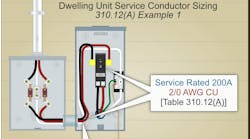You survived the first few weeks of your new job as an electrical apprentice — good work! If you're still there, you must be doing something right, so keep it up. In my last column, I went over etiquette for electrical apprentices. Now let’s dive into a few more rules to live by as you continue progressing in your new career.
First off, if most of your friends are going off to college soon, don't feel guilty you decided to opt out. You are saving yourself thousands of dollars (and compound interest) by not pursuing a career path you’re not interested in. Pursuing the electrical trade is like getting a magic carpet ride; it'll take you places you've never imagined, providing endless options for travel, income, networking opportunities, and continued education and training — if you play your cards right. But as you continue down the path toward becoming a seasoned electrical professional, keep the following factors in mind:
Your job is crucial. Remember that without you, there's no light, power, or data to keep things moving. There are thousands of homeowners and business owners all over the country who need electrical repairs, updates, and modifications who are anxiously waiting for you to arrive with your unique set of skills and talents. Do not take this responsibility lightly. If you ultimately master this craft, you shouldn’t have to search for work — jobs and opportunities will actually find you!
There’s no better time than the present to invest in better tools. Every two weeks, consider buying something small to expand your tool pouch or backpack. Never make a habit out of borrowing tools from your journeyman and coworkers; that type of behavior can become a nuisance real fast. Show everyone you’re serious about this trade. Think of it this way. If you create a bi-weekly budget for a new tool every paycheck instead of something frivolous you might want, you'll be looking like a journeyman in no time.
Always be on time for work. My advice is get there before the boss or your journeyman. Become someone they can depend on without a doubt — consistently known for your precision and accuracy. Some other details that may seem trivial also go a long way toward establishing your overall reputation. For example, wipe your feet as you go back and forth to the truck. Customers will appreciate that — and you’d better believe they’re watching. Put on some booties if you have to. Remember: When the boss isn't around, you are the company representative. So when you’re alone on the job site, it's your responsibility to demonstrate the company’s core values. Be respectful, courteous, and diplomatic. Always clean as you go, and make the job site area cleaner than you found it. That doesn’t mean circling back after you finish up to clean up the big mess you made either — do it now!
Become “mostly” self sufficient. Bosses can't be there all the time, so they're entrusting you to treat their customers professionally. If the boss has to be there constantly, he or she can't make money. After setting you up, the boss's job is to seek out the next project and put out fires — not babysit you. You’ve gotta fly on your own, so learn fast. However, keep in mind that there’s a fine line between being self-sufficient and knowing when to ask for help. For example, if a customer asks for some unauthorized extra the boss didn't tell you about initially, simply say: "That decision is above my paygrade, but I'll look into it for you." Never make decisions for the boss; always ask for guidance in dealing with customer matters and financial decisions. This type of mindset will help build trust with company leadership, and help establish you as a valuable asset. When customers start specifically requesting you are on their job site, you’re starting to reach the mark.
Know when to say no. Sometimes, it’s actually ok to say “no” — whether you’re talking about your personal or professional life. This might mean turning down something you’d rather do because it will make you late for work, resisting the urge to become distracted because you’re on the company clock, refraining from spending money because you’re on a tight budget, or keeping personal relationships from getting in the way of work. Now that you have a new job, it also might seem like that ATM card is burning a hole in your pocket with unlimited cash flow, but don't rush out yet and buy that new ATV or that 75-inch flat screen TV just yet. As an electrical apprentice in training, you’re getting a backstage pass to see how the world works from a technical standpoint, so stay focused. Never forget that you're getting paid to learn, so stay off that phone (Instagram can wait), pull up those pants, surround yourself with people who support you, and focus on the future with great optimism. The possibilities are endless.
De Loach, a master electrician and electrical trainer/instructor, is the founder of The Academy of Industrial Arts (www.taia-school.com) in Philadelphia. With more than 30 years of experience in the field, he will be writing regular exclusive content for E-Train and can be reached at [email protected].





